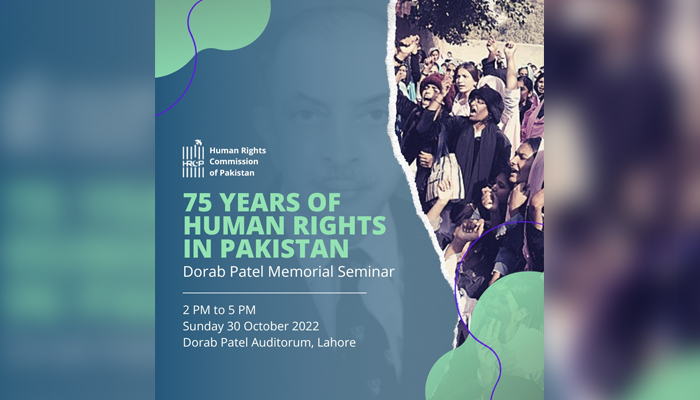Seminar on 75 years of human rights in Pakistan
LAHORE: If the days of Gen Zia’s oppressive martial law were the darkest chapter in the history of human rights in Pakistan, those very days also belonged to the most brilliant and most resilient resistance, Human Rights Commission of Pakistan Chairperson Hina Jillian said on Sunday. She was speaking at a seminar on 75 years of Human Rights in Pakistan at Dorab Patel Auditorium.
The speakers highlighted peoples’ struggles, achievements, setbacks and hurdles in the way to prosperity. Those who spoke at the Dorab Patel Memorial Seminar were Women’s Rights Activist Khawar Mumtaz, Salman Akram Raja Advocate, Minorities’ Rights Activist Peter Jacob, Badar Alam Journalist, Transgender Rights Activist Mehlab Jameel, Labour Leader Farooq Tariq and Chairperson HRCP Hina Jilani.
Khawar Mumtaz said while women’s lifespan has increased in the country, more women are getting education and participating in politics, people’s views about education has changed and so has their views on work, they are still considered dependent. There is recognition of their problems, she said, still Pakistan stands at 151 out of 153 in the gender inequality index for the last 10 years. Bangladesh has gone up.
Twenty-four percent girls are married before they turn 18. Violence against women is there and it is important to raise voice against violence. Women’s agency is most important, she said.
She recalled from history the struggles of women and the rights they won because they stood up for them. For instance two legislators Jahan Ara Shahnawaz and Shaista Ikramullah raised voice for women’s share in agricultural land. Another example she gave of APWA rallies against 2nd marriage. After that family laws came.
Hina Jillian added to this that the struggle of Women Action Forum (WAF) bore fruit when women came on every political party’s agenda. She said the credit for this went to WAF. Peter Jacob told the audience he found through Right to Information Act (RTI) that there are 18 religious identities in Pakistan. He called for actions and policies that lead to inclusion. A minority parliamentarian has moved a resolution to replace word ‘Minority’ with ‘Non-Muslim’. He said it was a bad idea because such language highlights exclusion.
He said it will be a big achievement whenever Tassaduq Hussain Jillani’s judgement on Minorities is implemented and stressed that nobody should be excluded on the basis of their religious identity.
Salman Akram Raja said, “In withholding people from expressing themselves, not allowing them right of association, the state has been obstructing justice. When people try to assert their right to express themselves enshrined `in the Constitution under Article 19, PECA law come into action.
“When public interest litigation became popular, the oppressive system started using it to weaken elected government. There is no recourse except to confront the powers that be.” Badar Alam said journalists have been attacked and killed in the last 10-12 years. He recited a poem of a Tunisian poet which said ‘Save me from my own people’. He counted the too many restrictions on media and the too many directions they get.
Mehlab Jameel said people do not have empathy for trangenders, the reason why their sufferings have increased over time. She quoted Articles 26, 27 that say there will be no discrimination on the basis of gender. She asked for right to social security and protection to transgenders.
-
 King Charles Makes It ‘absolutely Clear’ He Wants To Solve Royal Crisis
King Charles Makes It ‘absolutely Clear’ He Wants To Solve Royal Crisis -
 Royal Family Warned To ‘have Answers’ Amid Weak Standing
Royal Family Warned To ‘have Answers’ Amid Weak Standing -
 Marc Anthony On Why Bad Bunny’s Super Bowl Show Mattered
Marc Anthony On Why Bad Bunny’s Super Bowl Show Mattered -
 Kid Rock Gets Honest About Bad Bunny’s Performance At Super Bowl
Kid Rock Gets Honest About Bad Bunny’s Performance At Super Bowl -
 Kylie Jenner Reveals Real Story Behind Her 'The Moment' Casting
Kylie Jenner Reveals Real Story Behind Her 'The Moment' Casting -
 Eva Mendes Reveals One Costar She Envied Ryan Gosling Over
Eva Mendes Reveals One Costar She Envied Ryan Gosling Over -
 Halsey Marks Fiancé Avan Jogia's Birthday With Emotional Note
Halsey Marks Fiancé Avan Jogia's Birthday With Emotional Note -
 China: Stunning Drone Show Lights Up Night Sky Ahead Of Spring Festival 2026
China: Stunning Drone Show Lights Up Night Sky Ahead Of Spring Festival 2026 -
 Andrew's Epstein Scandal: Will King Charles Abdicate Following King Edward's Footsteps?
Andrew's Epstein Scandal: Will King Charles Abdicate Following King Edward's Footsteps? -
 Billy Joel Leaves Loved Ones Worried With His 'dangerous' Comeback
Billy Joel Leaves Loved Ones Worried With His 'dangerous' Comeback -
 Prince William Dodges Humiliating Question In Saudi Arabia
Prince William Dodges Humiliating Question In Saudi Arabia -
 Dax Shepard Describes 'peaceful' Feeling During Near-fatal Crash
Dax Shepard Describes 'peaceful' Feeling During Near-fatal Crash -
 Steve Martin Says THIS Film Has His Most Funny Scene
Steve Martin Says THIS Film Has His Most Funny Scene -
 Kensington Palace Shares Update As Prince William Continues Saudi Arabia Visit
Kensington Palace Shares Update As Prince William Continues Saudi Arabia Visit -
 Fugitive Crypto Scammer Jailed For 20 Years In $73m Global Fraud
Fugitive Crypto Scammer Jailed For 20 Years In $73m Global Fraud -
 Will Andrew Mountbatten-Windsor Finally Go To Jail Now That King Charles Has Spoken Out? Expert Answers
Will Andrew Mountbatten-Windsor Finally Go To Jail Now That King Charles Has Spoken Out? Expert Answers




